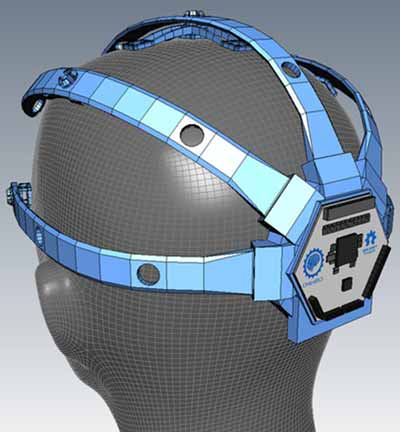OpenBCI DIY EEG brain-computer-interface Kickstarter ends Jan. 22 [update: $215,438 raised from 947 backers]
January 22, 2014

OpenBCI 3D-printable EEG headset concept design. Electrodes can be instantly moved and snapped into any of these sections for detecting EEG signals from different regions of the cortex. (Credit: OpenBCI)
The deadline for the OpenBCI Kickstarter, an open-source EEG brain-computer interface, is Wednesday Jan. 22 at 8:00pm EST. As of post time (Jan. 22 at 3:29 a.m. EST), $194,520 has been pledged (almost doubling the $100,000 goal), with 866 backers.
“If we reach $200K, we will host … and fund … one domestic and one international hackathon in addition to those funded through the hackathon reward levels … in summer 2014,” founders Joel Murphy & Conor Russomanno promise. Just $5,480 to go.
Here’s a quick update since our Dec. 12 KurzweilAI news article:
- OpenBCI has announced a 3D-printable headset that allows for printing the skeleton for flexible placement of EEG (electroencephalogram) electrodes to detect different regions of the cortex — not possible with commercially available EEG headsets.
- LulzBot is donating a TAZ 3 3D printer to OpenBCI and printing supplies. “The LulzBot Taz 3 has one of the largest build volumes and the fastest print speed of any 3D printer on the market, and it can print a wide range of materials,” say the OpenBCI founders.
- OpenBCI is now providing a choice between an Atmel 8-bit Atmega328 core (for novice programmers and people already familiar with the Arduino environment) and a 32-bit PIC core made by Microchip (for faster data rates at higher channel counts — see chipKIT for reference).
- If you support the Kickstarter at the Research Partner reward tier, “you will be invited to an exclusive OpenBCI Research Partner conference hosted in NYC in the late Spring to help us shape the future of the OpenBCI movement. In addition, you will receive 5 OpenBCI boards or daisy-chain modules, an electrode cap identical to the one seen in our video, and an Electrode Starter Kit.”
- OpenBCI announced four research partnerships: France-based Mensia Technologies, a technology start-up focused on the wellness and healthcare applications of real-time, quantitative neurophysiology; Professor Virginia de Sa and the University of California San Diego’s Cognitive Science Department; FamiLAB, an Orlando hackerspace; and The London Quantified Self Meetup Group.
- Melon, an EEG-based Kickstarter that was successfully funded in the Summer of 2013, has sponsored an OpenBCI/Melon joint hackathon to be hosted this coming summer in Los Angeles.
Culture Hub/Volumetric Society/Internet Society presentation in NYC Dec. 16, 2013
OpenBCI: An Open Source Brain-Computer Interface